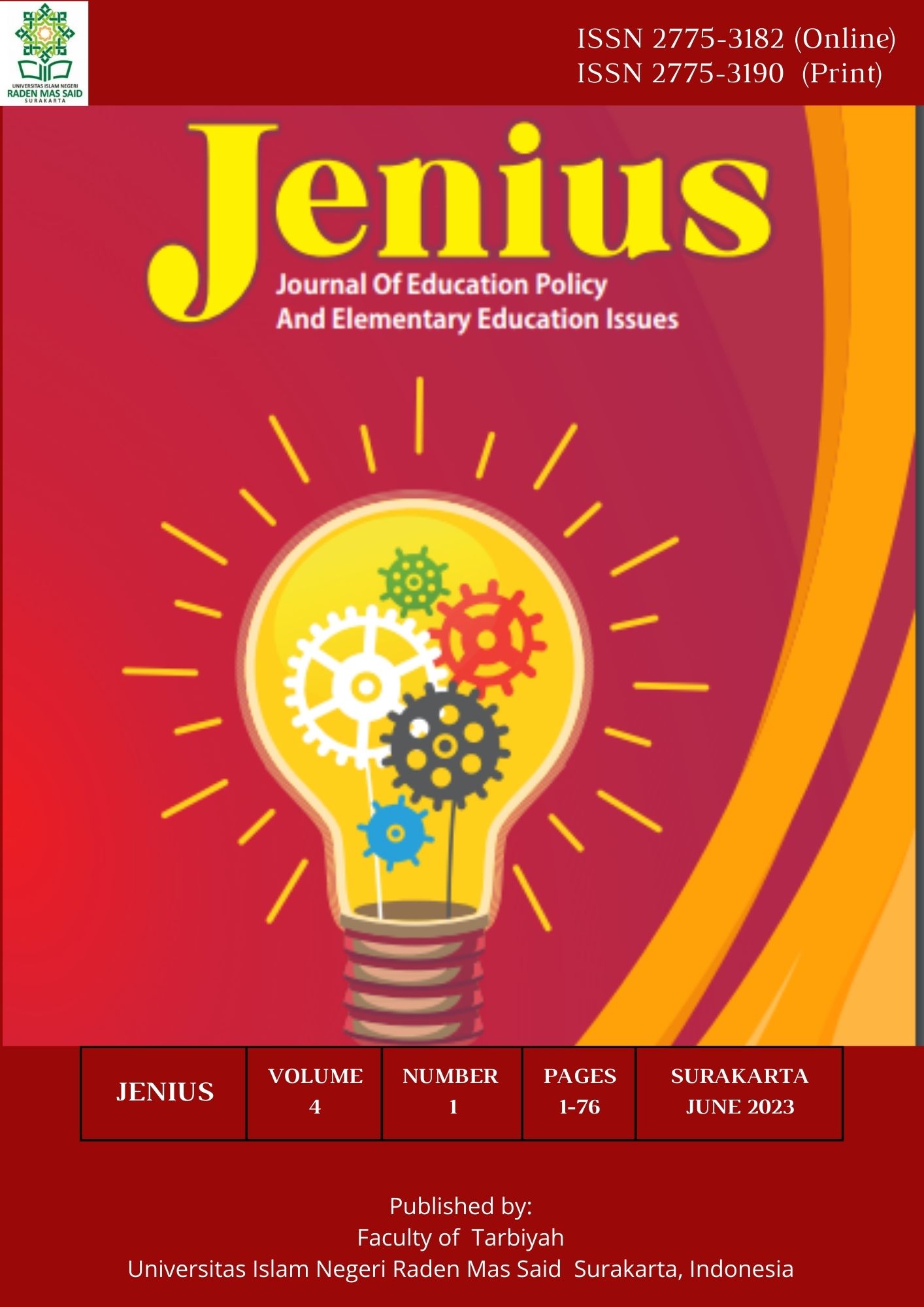Analysis of Supporting and Inhibiting Factors of Students' Critical Thinking Ability at Islamic Elementary School
Main Article Content
Keywords
Critical Thinking , Inhibiting Factors, Supporting Factors
Abstract
This research is motivated by the many factors influencing students' critical thinking skills. The purpose of this study was to review the supporting and inhibiting factors for students' critical thinking skills at MIN 4 Sukoharjo, Kab. Sukoharjo, Central Java. This research is descriptive with the type of qualitative research and data collection through interviews and observation. The resource person interviewed was one of the class VI teachers at MIN 4 Sukoharjo. The research showed several supporting and inhibiting factors for students' critical thinking skills at MIN 4 Sukoharjo. The results of the research are in the form of supporting factors for students' critical thinking skills as follows: (1) School facilities in the form of Indonesian Madrasah Competency Assessment/Asesmen Kompetensi Madrasah Indonesia (AKMI) books for class V; (2) Implementing the 2013 Curriculum; (3) School policies that free teachers to explore students, and (4) Selection of appropriate learning methods and models. Meanwhile, the results of the research were in the form of inhibiting factors for students' critical thinking skills as follows: (1) The facilities provided for those other than class V were only in the form of providing HOTS questions based on the subject by each teacher; (2) Teachers are less creative and innovative which causes learning activities to be not conducive; (3) the intellectual level of students and limited learning time, and (4) teachers do not master IT
Downloads
References
Almulla, M. A., & Al-Rahmi, W. M. (2023). Integrated social cognitive theory with learning input factors: the effects of problem-solving skills and critical thinking skills on learning performance sustainability. Sustainability (Switzerland), 15(5). https://doi.org/10.3390/su15053978
Cahyono, B. (2017). Analisis ketrampilan berfikir kritis dalam memecahkan masalah ditinjau perbedaan gender. AKSIOMA: Jurnal Matematika dan Pendidikan Matematika, 8(1), 50-64. https://doi.org/10.26877/aks.v8i1.1510
Daryanto. (2014). Pendekatan pembelajaran saintifik kurikulum 2013. Gava Media.
El Soufi, N., & See, B. H. (2019). Does explicit teaching of critical thinking improve critical thinking skills of English language learners in higher education? A critical review of causal evidence. Studies in Educational Evaluation, 60, 140–162. https://doi.org/10.1016/j.stueduc.2018.12.006
Fuad, N. M., Zubaidah, S., Mahanal, S., & Suarsini, E. (2017). Improving junior high schools' critical thinking skills based on test three different models of learning. International Journal of Instruction, 10(1), 101–116. https://doi.org/10.12973/iji.2017.1017a
Ibrohim, I., Purwaningsih, E., Munzil, M., Hidayanto, E., Sudrajat, A. K., Saefi, M., & bin Hassan, Z. (2022). Possible links between Indonesian science teacher's TPACK perception and demographic factors: Self-reported survey. EURASIA Journal of Mathematics, Science and Technology Education, 18(9), em2146. https://doi.org/10.29333/ejmste/12282
Ku, K. Y. L., Kong, Q., Song, Y., Deng, L., Kang, Y., & Hu, A. (2019). What predicts adolescents' critical thinking about real-life news? The roles of social media news consumption and news media literacy. Thinking Skills and Creativity, 33. https://doi.org/10.1016/j.tsc.2019.05.004
Machin, A. (2014). Implementasi pendekatan saintifik, penanaman karakter dan konservasi pada pembelajaran materi pertumbuhan. Jurnal Pendidikan IPA Indonesia, 3(1), 28–35. https://doi.org/10.15294/jpii.v3i1.2898
Magdalena, I., Hasna Aj, A., Auliya, D., & Ariani, R. (2020). Analisis kemampuan berpikir kritis siswa kelas vi dalam pembelajaran ipa di sdn cipete 2. In Pensa : Jurnal Pendidikan dan Ilmu Sosial (Vol. 2, Issue 1). https://ejournal.stitpn.ac.id/index.php/pensa
Mahanal, S., Zubaidah, S., Sumiati, I. D., Sari, T. M., & Ismirawati, N. (2019). RICOSRE: A learning model to develop critical thinking skills for students with different academic abilities. International Journal of Instruction, 12(2), 417–434. https://doi.org/10.29333/iji.2019.12227a
Marlina, L., Liliasari, Tjasyono, B., & Hendayana, S. (2018). Improving the critical thinking skills of junior high school students on Earth and Space Science (ESS) materials. Journal of Physics: Conference Series, 1013(1). https://doi.org/10.1088/1742-6596/1013/1/012063
Machali, I. (2014). Kebijakan perubahan kurikulum 2013 dalam menyongsong Indonesia emas tahun 2045. Jurnal Pendidikan Islam, 3(1), 71-94. https://doi.org/10.14421/jpi.2014.31.71-94
Putu, N. (2018). Meningkatkan keterampilan berpikir kritis siswa melalui pendekatan saintifik di sekolah dasar. Jurnal Ilmiah Pendidikan Citra Bakti, 3(2), 239–256. https://doi.org/10.22437/gentala.v3i2.6760
Saputri, M. A. (2020). Penerapan model pembelajaran problem based learning untuk meningkatkan kemampuan berfikir kritis siswa kelas v sekolah dasar. Jurnal Pendidikan Dan Konseling (JPDK), 2(1), 92–98. https://doi.org/10.31004/jpdk.v1i2.602
Setiawati, H., & Corebima, A. D. (2017). Empowering critical thinking skills of the students having different academic ability in biology learning of senior high school through pq4r - tps strategy. The International Journal of Social Sciences and Humanities Invention. https://doi.org/10.18535/ijsshi/v4i5.09
Shofia, N. A., & Ahsani, E. L. F. (2021). Pengaruh penguasaan it guru terhadap kualitas pembelajaran dimasa pandemi. Forum Paedagogik, 12(2), 201–215. https://doi.org/10.24952/paedagogik.v12i2.3901
Sugiyono. (2013). Metode penelitian kuantitatif kualitatif dan R&D. In Bandung: Penerbit Alfabeta. Bandung: Penerbit Alfabeta.
Susilo, H., Kristiani, N., & Sudrajat, A. K. (2020,). Development of 21st century skills at the senior high school: Teachers' perspective. In AIP Conference Proceedings (Vol. 2215, No. 1, p. 030018). AIP Publishing LLC. https://doi.org/10.1063/5.0000559. https://doi.org/10.1063/5.0043157
Susilo, H., Sudrajat, A. K., & Rohman, F. (2021). The importance of developing creativity and communication skills for teacher: Prospective teacher students perspective. In AIP Conference Proceedings (Vol. 2330, No. 1, p. 030059). AIP Publishing LLC.
Syafitri, E., Armanto, D., & Rahmadani, E. (2021). Aksiologi kemampuan berpikir kritis (kajian tentang manfaat dari kemampuan berpikir kritis). Journal of Science and Social Research, 4(3), 320-325. https://doi.org/10.54314/jssr.v4i3.682
Zubaidah, S., Fuad, N. M., Mahanal, S., & Suarsini, E. (2017). Improving creative thinking skills of students through Differentiated Science Inquiry integrated with mind map. Journal of Turkish Science Education, 14(4), 77–91. https://doi.org/10.12973/tused.10214a


